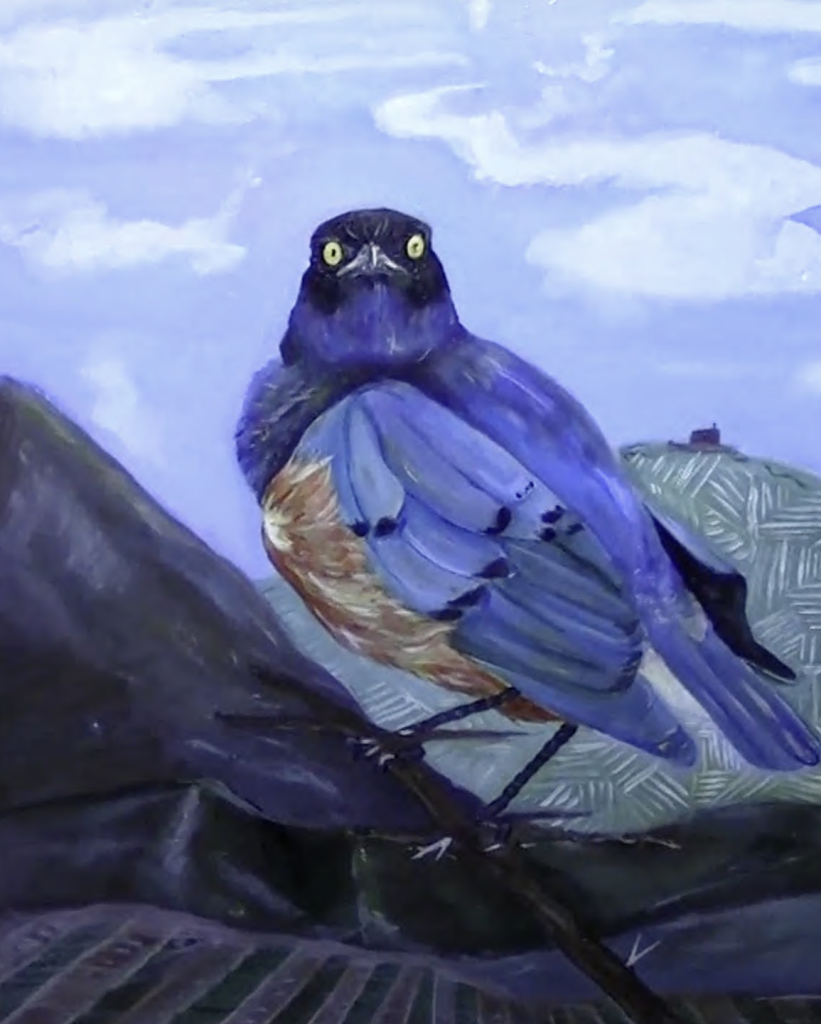Student Artist journals her life experiences through art

By Peyton Leone
Charis Pulei was born in the U.S before her family moved to Arusha, Tanzania. She works as an resident assistant on campus and her dorm room is like a living gallery that displays her work. Paintings on the wall, ceramics on the table, and pile of yarn show how her process of creation takes many forms.
She says her art is a way for her to tell a story or to create a piece to decorate her space.
Pulei painted birds from Tanzania on the sides of her night stand. The pied crow, guinea fowl and superb starling are scavenger birds that are surviving climate change.
“The fact that these are the three main birds that I think of when I think of home for me says a lot about what climate change is doing,” Pulei

She remembers beginning art during a time when her mother was a teacher and her father a philosophy professor. She found that art coloring books were a way to entertain herself during her parent’s lectures which they would often take her to.
Her painting “Ndoto ya Moyo”, which means “Dream of the Heart” in Kiswahili, is a large cut wooden board with acrylic and oil paints and symbolizes her relationship with her father and the Maasai tradition.
“Being biracial, it was kinda hard to have my tribal culture be taught to me sometimes, because my mom is white. A lot of the times there was family conflicts on my dads side about how much I was really entitled to learn and welcomed into,” said Pulei.
“The fact that I’m allowed to have long hair is not something that would be tribally normalized… Having my father braiding my hair in this painting symbolizes a lot of love and acceptance and intercultural development.”
Her father is painted with full Marrai (Massai Warrior) regalia, wearing a shuka, braided Cuffs, braided hair, a staff and feathers. At the bottom of the painting is a broken spearhead which represents the breaking from tradition.
“As much as my father did try, he also isn’t really connected to his culture because of governmental things that were happening due to colonialism in Kenya when he was growing up. A lot of children his age were being forced to go to school instead of being allowed to have their cultural education, and my father was unfortunately one of those kids,” said Pulei.

Pulei says that she wants to push against commodifying her life experience in her work as a Kenyan and Tanzanian person. The stories she tells in her art are deeply personal to the story of her life and who she is.
“I want my art to detail more of a personal element and be more specific to myself and my experiences rather than a commentary on the entire diaspora, because that just feels like a payout.”

One painting hanging on her wall is titled “Mshukuru Mungu kwa wakati wote” which means “You have to thank god for the little moments” in Kiswahili. It is styled like a Kanga cloth and has a locket and ivory ring on it representing the mixing of her parent’s cultures.
Pulei created a ceramic chess set where each piece represents the dark and light side of different emotions. The white knights are joyful puppies and the black knights are owls.
“Back home owls are actually taboo, they are considered the bringers of death,” said Pulei. “Putting them as the little intermediaries between the dark and light sides of the chess set was just something I felt like was important to me.”




